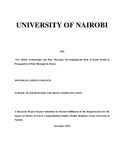| dc.description.abstract | This study sought to investigate the use of Social Media in propagation of hate messages in
Kenya. It was carried out among undergraduate students of The Co-operative University College
of Kenya, Karen. The sample size was 200 units. The objectives of this study were: To establish
the presence of hate content on social media, to determine the extent of exposure to hate
messages among social media users, to explore the nature of hate messages on social media and
to determine the diffusion (flow and spread) of hate messages online.
The new media can play a key role in advocacy of human rights, preventing atrocities like
genocide, ethnic cleansing, mutinies, rebellions, and revolts, and mobilization to a course. It can
also be used to span ethnic hatred, religious intolerance, radicalization, racial divisions and
spreading of hate messages. By informing, educating and perhaps sometimes by deceiving, the
media in any society is the epicenter of the events palpable; such is the power of the media.
However, this power of the mainstream media is experiencing competition as well as boost from
the social media coupled by fast-growing technology. Inasmuch as the mainstream media is self
regulatory in various aspects, in the matter hate speech, the law is specifically in the ambit of the
State. To the contrary, social media is an open field devoid of a grip of control. This coupled by
vague legal framework on hate speech, has provided a fertile ground for spread of hate content.
Conversely, hate speech is becoming one of the greatest tools to spur violence, mass atrocities,
ethnic hatred, radicalization, and religious intolerance among other discords. This aspect needs to
be taken into consideration and addressed firmly. Few studies have been carried out to address
the aspect of new media technologies and hate speech. The study adopted a descriptive survey
design allowing for the collection of information and data without changing or manipulating the
environment. The study used descriptive statistics to show distribution, relationships between
variables under study, proportions in terms of texts, percentages, charts and tables. The study
found out that hate speech is rife in the social media space; Top in the categories is ethnic hatred
at 55.9%, political hate at 50.2% and religious hate at 34.3%. The study recommends education
from elementary levels by introducing hate speech studies into curriculums, and more behavior
change campaigns, enact tougher legal penalties to deal with propagators of hate speech on
social media and mainstream media. Also, more studies to be carried in this area to bridge the
academic gap and find more practical solutions to hate speech prevention, mitigation and
possible elimination | en_US |

